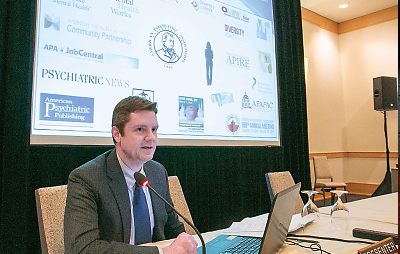Strategic planning and a potential new headquarters for APA were among the issues discussed at an unusually busy Board of Trustees meeting in March.
Most prominently, the Board voted to initiate a due-diligence review for the purchase of a property that could serve as APA’s new headquarters in Washington, D.C. If a deal can be negotiated that meets APA’s criteria, and the Board approves the purchase, APA would move into the new headquarters building after the Association’s current lease in Arlington, Va., ends in December 2017.
At the Board’s meeting in December 2014, Trustees had approved the search for a new property after an in-depth presentation by the Ad Hoc Work Group on Real Estate. Frank Brown, M.D., APA treasurer and chair of the work group, summarized those options as staying in the current building, seeking another rental space, or purchasing an existing or new building in Washington, D.C., or the surrounding area.
Trustees opted for the purchase of a new or existing building in the District of Columbia for several reasons: the importance of proximity to Capitol Hill for advocacy, the historically strong performance of real estate values in the District of Columbia, and the ability to control use of space and influence the design of the property.
“We will move cautiously and judiciously in the search for a new headquarters for APA, keeping all options open, and we will keep members informed about this process,” APA President Paul Summergrad, M.D., said. “To identify the best possible home for our association, we must complete a rigorous due-diligence review before finalizing any agreement.”
APA CEO and Medical Director Saul Levin, M.D., M.P.A., agreed. “There are many good reasons for APA to have its own property in close proximity to Capitol Hill, especially for our advocacy efforts and the many medical association meetings our leadership, members, and staff attend. There has been a lengthy process of careful review and detailed financial analysis by the Ad Hoc Work Group on Real Estate and the Board that has brought us to this point, but we will continue to move prudently before a final decision is made.”
Plan Reflects Transition to Integration
In other news, the Board approved four overarching strategic initiatives recommended by the Ad Hoc Work Group on Strategic Planning. These strategies will be achieved through increased advocacy, effective communication, strengthened member services, a well-structured association, and collaboration with other medical and mental health organizations.
•
Advancing the integration of psychiatry in the evolving health care delivery system.
•
Educating patients, families, the public, and other practitioners about mental disorders and evidence-based treatment options.
•
Supporting and increasing diversity within APA; serving the needs of evolving, diverse, underrepresented and underserved patient populations; and working to end disparities in mental health care.
Supporting research to advance treatment and the best possible clinical care to inform credible quality standards and advocating for increased research funding.
At the Board meeting, Summergrad said a survey of members indicated concern about the changing health care environment. “Our field is shifting toward integrated, coordinate care requiring collaboration with other physicians,” he said. “Our members are really looking for help in doing this, and our strategic planning initiatives will provide direction for developing tools to aid our members in this transition. We have a very strong sense from our membership that advocacy is critical and that we are in a transforming health care environment.” (More information on the strategic plan appears in the March 20 issue in the “
From the President” column.)
The Board also acted on these issues:
•
Branding: Trustees voted to approve the “rebranding” recommendation of APA Chief Communications Officer Jason Young and the consulting firm Porter Novelli. The rebranding entails the introduction of a new logo and tagline for APA. It also includes a repositioning of the Association to more clearly demonstrate its value to members and society, especially patients, their families, and policymakers, and to identify APA as the organization that represents medical leadership in the mental health field. The Benjamin Rush seal, which has been used as APA’s logo since 1921, will continue to be used for ceremonial purposes. The new logo will be launched at APA’s 2015 annual meeting in Toronto.
•
Maintenance of Certification (MOC): Trustees, acting on the recommendation of the Assembly Executive Committee, voted to support the elimination of Part 4 of the MOC requirements and to recommend to the American Board of Psychiatry and Neurology that it advocate to the American Board of Medical Specialties (ABMS) for the elimination of Part 4 of MOC (see page 16). The ABMS oversees certification and MOC for all medical specialties.
•
American Psychiatric Foundation (APF): Trustees voted to appoint Steven Sharfstein M.D., M.P.A., William Resnick, M.D., Louis Kraus, M.D., and Uyen-Khanh Quang-Dang, M.D., to the APF Board of Directors for terms of three years, beginning in May.
•
Medical Education and Residency Training: The Board approved a report by the Ad Hoc Work Group on Education and Training that includes position statements that will be forwarded to the Joint Reference Committee and later to the Assembly for consideration at its May meeting. (Additional information on the report appears in the April 3 issue in the “
From the President” column.)
•
Health Care Reform: The Board voted to accept the report of the Ad Hoc Work Group on APA Health Care Reform and its recommendations and forward them to the APA administration to develop an implementation plan. Further, Trustees voted to approve the reconvening of the Ad Hoc Work Group on APA Health Care Reform at APA’s September Component Meetings to review APA’s implementation plan (see “
From the President” in this issue). The work group was asked to report back to the Board at its October meeting on this review. ■
The minutes from the March meeting will be posted after the Board’s May meeting. APA members can access the minutes
here.


